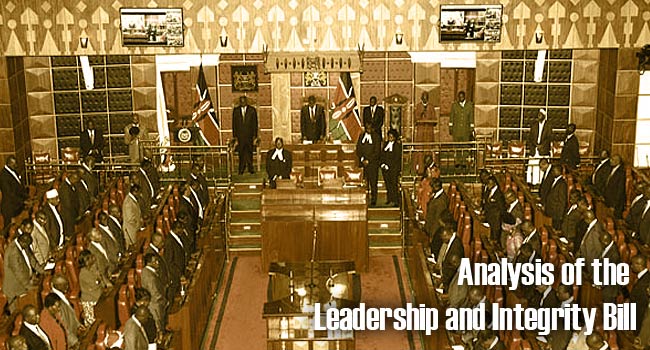Analysis of the Leadership and Integrity Bill

Chapter Six of the constitution endeavors to uphold and restore the rule of law in Kenya by providing guidelines that govern on leadership and integrity.
With the existing political climate and the much-anticipated general elections, the need to establish scales that will weigh the efficacy and credibility of the future and the incumbent leaders of our nation cannot be evaded. Kenyans needs to have confidence in the constitutional offices. The Constitution dedicates a whole chapter to making provisions that will ensure an effective administration that cuts across all leadership ranks.
Under chapter six of the constitution, article 73 advocates for a leadership that upholds personal integrity, objectivity and impartiality; a leadership that is selfless, promotes public integrity and supports the spirit of the Law. Further to this, Article 75 clearly affirms that whether in public places, official places, in private or in association with other persons, a state officer shall behave in a manner that avoids demeaning the office he or she holds. Article 79 stipulates that Parliament shall enact legislation to establish an independent ethics and anti-corruption commission, which shall be and have the status and powers of a commission under Chapter Fifteen, for purposes of ensuring compliance with, and enforcement of, the provisions of this Chapter.
The Leadership and Integrity bill was and still is supposed to give legislative weight to chapter 6 of the constitution. Article 80 requires the Parliament to enact legislation that will give effect to, and establish procedures and mechanisms for the effective administration of this Chapter. This is for the purpose of promoting ethics, integrity and servant leadership among State officers; providing for the extension of the application of certain provisions of Chapter Six of the Constitution and the Act to public officers.
Under the Constitution (Article 260), a "state officer" means a person holding a state office. A "public office" means an office in the national government, a county government or the public service, if the remuneration and benefits of the office are payable directly from the Consolidated Fund or directly out of money provided by Parliament; "public service" means the collectivity of all individuals, other than State officers, performing a function within a State organ. The word "State" connotes offices, organs and other entities comprising the government of the Republic.
The Leadership and Integrity Bill, sponsored by the Ministry of Justice and Constitutional Affairs contains various provisions that are imperative in shaping the country's leadership. These include the general and specific leadership and integrity code, mechanisms for enforcement of the leadership and integrity code, the requirement for declarations of income, assets and liabilities, disciplinary measures which include penalties for offences, the establishment of the Kenya Leadership and Integrity Forum to promote leadership and integrity principles, transitional provisions and amendments.
In commending the positive spirit behind the drafting of the Bill, several concerns were raised. Once the Bill was tabled in Parliament, major changes were made on the document which would better be referred to as mutilations. The gist of the document was 'watered down' to a rather lenient manual that could be manipulated to allow unscrupulous state officers retain their leadership positions.
It is unfortunate that after the extensive whistle blowing that was carried out concerning the defective Leadership and Integrity Bill 2012, the Legislators gave a cold shoulder to the Bill initially drafted by the Commission for the Implementation of the Constitution (CIC).
Below are the changes that have since been experienced and assented in the new document:
- The clause compelling those seeking elective office to declare their wealth before going for election was deleted.
- The vetting of all candidates by the Ethics and Anti Corruption Commission EACC before receiving a nomination certificate from the Independent Electoral and Boundaries Commission IEBC has also been done away with. Therefore those seeking elective positions (presidential, parliamentary and county assembly posts) will not be vetted by State agencies.
- In passing this Bill, Parliament has overlooked these stringent vetting requirements that would have seen more severe but apt Bill on Leadership and Integrity passed.
- It had provisions that required those seeking public office to be cleared by the relevant State agencies. A clearance from the Kenya Revenue Authority, Higher Education Loans Board, and the National Police Service, or any other public entity would have been required.
Even after promulgation of the new Constitution, it is evident that the mechanisms that were intended to bring about accountability and transparency across all institutions are being frustrated.
It is a sad reality that the very legislators expected to steer our nation into realizing the constitutional principles set out in Article 10, are retrogressing the process.
It is however not an irreversible tragedy as the ultimate power rests in the hands of Kenyans through their vote.


